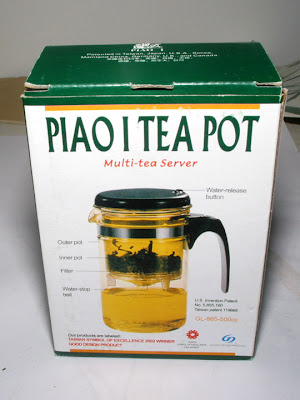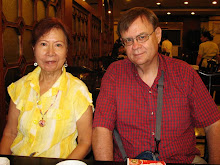One of the few best Chinese black teas, given as tribute by Yunnan local government to visiting foreign VIP’s and Chinese top leaders. Growing in organic tea gardens of high mountains, only fat fine buds of Spring first crop are plucked to produce this Golden Bud A. Less than 2,000kg made each year. Attractive golden buds without a black leaf in sight. This tea brews a bright amber color liquor. Smooth, sweet honey flavor with elegant flowery aroma. Highly prized by tea connoisseurs. (http://www.pu-erhtea.com/BlackTea.htm)
Pretty impressive write-up, wouldn't you agree? Of course, the site is a commercial tea site so they will never have any negative write-ups about their teas. The information we were given about this tea pretty well matched the above description.
It was the best black tea money could buy out of Yunnan according to the guy we bought it from. He had a tea shop that specialized in tea from Yunnan and, of course, he was from Yunnan. It is called Jin Ya or Golden Bud/Shoot. The guy we bought it from in the Tea Culture Town gave some pretty good information about the tea and we tasted it before we bought it. Sunee does not care for it (she thinks it taste like Thai tea) but I like it because I definitely "feel" its effects on me almost immediately. Here is the "tasting" of the Yunnan Golden Bud Black Tea.

As you can see, the tea leaves are almost entirely golden in color. This means it has been hand-picked and only the "buds" or "shoots" have been chosen.

This is a very impressive close up to show the golden hue that each tea leaf has plus the white hairs that cover the buds. According to the seller, the number of golden leaves and the fine hair is the guarantee that this tea is what he says it is.

This tea makes a beautiful dark amber liquid. It really is as beautiful a tea as one will ever fine, IMHO. It looks like tea to the Western eyes. The taste is smooth from start to finish. It does not have the characteristic green tea bite at the beginning and the green tea aftertaste. It is smooth and mellow with hints of smoke and pepper. The effects are almost immediate for me. My face gets very numb all over and makes me feel very relaxed. It is almost like getting a shot of novacaine at the dentist office. Is this the "qi" thing that I have read about at some of the sophisticated tea sites on the web such as Mattcha? I will definitely buy some more of this tea when we return to Chengdu in a couple of weeks. It will also make nice Christmas gifts to my friends and relatives in Thailand. Too bad I have no way of getting it back to the United States before Christmas. Maybe next year, big brother, maybe next year.
As I mentioned earlier, Sunee does not care for this tea. She thinks it tastes like the cheap Thai tea she is used to. For me, I like it a lot and especially for the feeling I get after drinking it. My mind is clear but my body is very relaxed. Guess that is why we drink tea and the Chinese wrote so many lines of poetry about drinking tea.

Here are the leaves after my last steeping (third infusion). I have seen some of my favorite tea blogs show pictures of the tea leaves when they were done with them. Hey, I can do that too!
One thing I have found about this tea, it is only good for two or at the most three infusions. I am waiting now to have my third and final Yunnan Golden Bud Black Tea. Why not come and join me?








